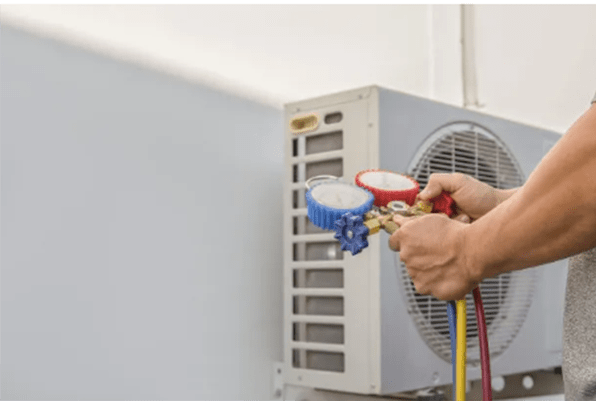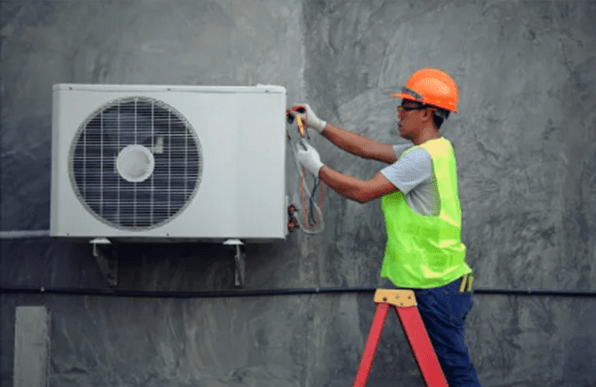
Figure 1: Air conditioner outdoor unit.
The AC compressor is an essential component of an air conditioning system, responsible for compressing and circulating refrigerant that cools down the air.
However, like any mechanical device, the AC compressor can also fail over time due to various reasons. In this article, we will explore some of the common causes of AC compressor failure, including symptoms to look out for, and how to prevent it.
1. 4 Signs of AC Compressor Failure
Before diving into the reasons behind AC compressor failure, it's essential to understand the signs that indicate a faulty compressor. Here are some of the most common symptoms of home AC compressor failure (home ac compressor failure symptoms):
1.1 AC Compressor Won't Kick on/AC Compressor Not Turning on
If you notice that your AC compressor won't turn on despite the air conditioner running correctly, it's a clear sign that there's something wrong with the compressor. This could be due to a faulty capacitor or an electrical problem, requiring a professional diagnosis to fix.

Figure 2: Cutaway view of AC compressor.
1.2 Warm Air Coming out of Vents
If your air conditioning system is blowing warm air instead of cool air, it could be due to a malfunctioning compressor. The compressor may not be able to circulate refrigerant effectively, resulting in poor cooling performance.
1.3 Unusual Noises
A faulty AC compressor may produce unusual noises, such as grinding, clicking, or hissing sounds. These sounds could indicate that the compressor is about to fail and requires immediate attention from a technician.
1.4 Leaking Refrigerant
If you notice refrigerant leaks around your AC unit, it could be a sign of a failing compressor. Refrigerant leaks can cause your AC system to lose efficiency and eventually stop working altogether.

Figure 3: Add refrigerant to the AC compressor.
2. What Causes AC Compressor Failure? - 11 Common Reasons
Now that we've discussed the symptoms of AC compressor failure let's explore some of the common reasons behind compressor malfunction:
2.1 Lack of Power Supply
If your AC compressor won't kick on, the first thing you should check is the power supply. Make sure that your AC unit is plugged in and that the circuit breaker hasn't tripped.
If everything seems fine, the problem could be caused by a faulty capacitor or a damaged electrical connection. In this case, it's best to call a professional to help you diagnose and fix the problem.
2.2 Electrical Problems
One of the most common reasons behind AC compressor failure is electrical problems. A faulty capacitor or relay switch can cause the compressor to fail, preventing it from starting or running correctly. In some cases, wiring issues can also cause electrical problems for the AC compressor.
2.3 Low Refrigerant Levels
Refrigerant is vital for the proper functioning of an air conditioning system, and low refrigerant levels can cause the AC compressor to fail. If there's not enough refrigerant in your AC unit, the compressor may overheat, causing the AC compressor to work harder than necessary, which could ultimately cause it to fail.
Low refrigerant levels can be caused by refrigerant leaks due to various reasons, including wear and tear, improper installation, or punctures.
2.4 Dirty Coils
Dirty coils can also cause your AC compressor not to turn on. However, over time, air conditioning coils (evaporator coil and the condenser coil) can become dirty and clogged with dust, dirt, and other debris, reducing their efficiency. Dirty coils can cause the AC compressor to overwork, increasing the risk of failure.
To prevent this from happening, it's important to have your AC unit serviced regularly to keep the coils clean.

Figure 4: Clean the AC indoor unit.
2.5 Contamination
Contamination of the AC system can cause the compressor to fail. Moisture or debris can enter the system, causing corrosion, clogs, or other damages that affect the performance of the compressor.
Solution: Have your AC system regularly serviced by a professional technician. They can help identify any contamination and remove it from the system, ensuring the compressor remains in good condition.
2.6 Overheating
Overheating is another common reason for AC compressor failure. The compressor can overheat due to excessive use or high temperatures, leading to damage to the compressor's internal components.
Besides, an insufficient amount of refrigerant is also a common cause of overheating. Without enough refrigerant, the compressor has to work harder to cool your space, leading to overheating.
Another common cause of overheating is dirty condenser coils, which restrict airflow and cause the compressor to work harder than necessary.
Solution: Avoid prolonged periods of use in hot conditions, such as idling with the AC system on. If you suspect your compressor has overheated, have it checked by a professional technician immediately to prevent further damage.
2.7 Overworking the AC
Running your AC system continuously without a break can cause the compressor to overwork and eventually fail. This often happens when the outdoor temperature is high, and the AC unit is trying to maintain a cool temperature indoors.
One way to prevent this is by setting your thermostat to a higher temperature when you are not at home or using a programmable thermostat to automate your settings.
2.8 Malfunctioning Components
Faulty components in your AC unit can cause the compressor to fail. Some of these components include the fan motor , capacitors, and contactors. When these parts malfunction, they can result in overworking the compressor, causing it to overheat and eventually shut down.
It's essential to replace these faulty components promptly to avoid further damage to your AC system.

Figure 5: AC compressor capacitor.
2.9 Lack of Lubrication
One of the leading causes of compressor failure is a lack of lubrication. The compressor's parts require adequate lubrication to function correctly and prevent friction from causing damage. Without sufficient oil, the compressor's bearings can wear out and seize, causing the entire unit to fail.
Make sure to schedule regular maintenance services to ensure that your AC unit has enough refrigeration oil.
2.10 Lack of Maintenance
Regular maintenance of your air conditioning system is essential to ensure its proper functioning and prevent any potential issues. A lack of maintenance can cause various problems, such as dirty filters, dirty coils, or worn-out parts, leading to compressor failure.
2.11 Age
Age is also a contributing factor to AC compressor failure. The compressor's lifespan varies depending on usage, maintenance, and manufacturing quality. Over time, the compressor may lose efficiency or suffer from internal damages, leading to failure.
Solution: Regularly maintain your AC system and have it inspected by a professional technician. The average lifespan of an AC unit is about 10-15 years. If your system is approaching this age range, it's advisable to consider upgrading to a new one to avoid costly repairs.
3. 4 Ways to Prevent AC Compressor Failure
While AC compressor failure is inevitable, there are several preventive measures you can take to prolong its lifespan and prevent premature failure:
4.1 Proper Installation
Ensure that your AC unit is installed correctly by a licensed technician to prevent future problems, such as refrigerant leaks or electrical issues.

Figure 6: Install air conditioner.
4.2 Regular Maintenance
Regular maintenance of your air conditioning system, such as changing the air filter, cleaning the coils, and checking refrigerant levels, can prevent potential issues that may lead to compressor failure.
4.3 Timely Repairs
If you notice any signs of AC compressor failure, such as unusual noises or warm air coming out of your vents, it's crucial to get it checked by a professional technician immediately. Timely repairs can prevent further damage to the compressor and save you from costly repairs.

Figure 7: Install air conditioner.
4.4 Avoid Overworking Your AC
Avoid overworking your AC by setting the temperature to an optimum level, usually around 78 degrees Fahrenheit. Running your AC continuously with a lower temperature set can cause the compressor to work harder than necessary, increasing the risk of failure.
4. Conclusion
In conclusion, the AC compressor is a vital component in your cooling system that requires proper care and maintenance to function correctly. The leading causes of AC compressor failure are lack of lubrication, overheating, electrical issues, and contaminants in the system.
You can prevent compressor failure by scheduling regular maintenance, proper installation, keeping your coils clean, and checking refrigerant levels. With these tips in mind, you can enjoy a cool and comfortable home all year round.
Related Info
Why Does My AC Compressor Turn on and off Repeatedly?AC Compressor Cost in 2023: How Much is an AC Compressor?
How to Check AC Compressor: A Comprehensive Guide
How to Fix an AC Compressor?
How to Tell If AC Compressor is Bad


